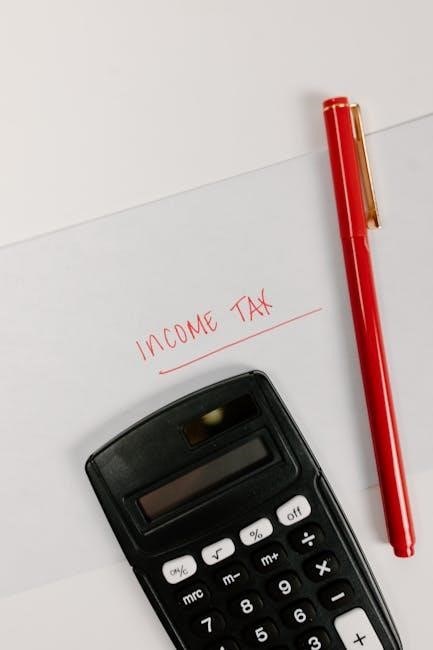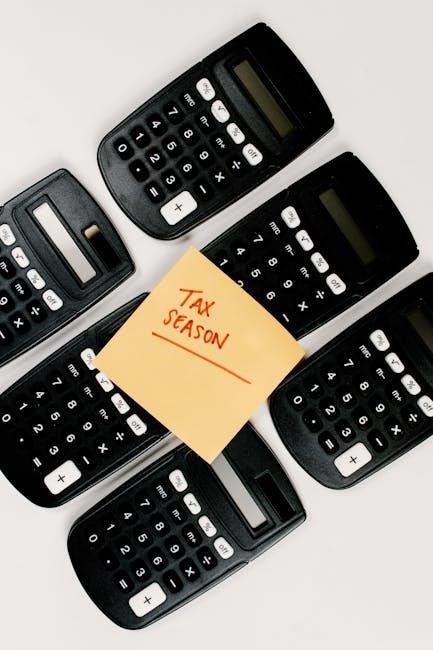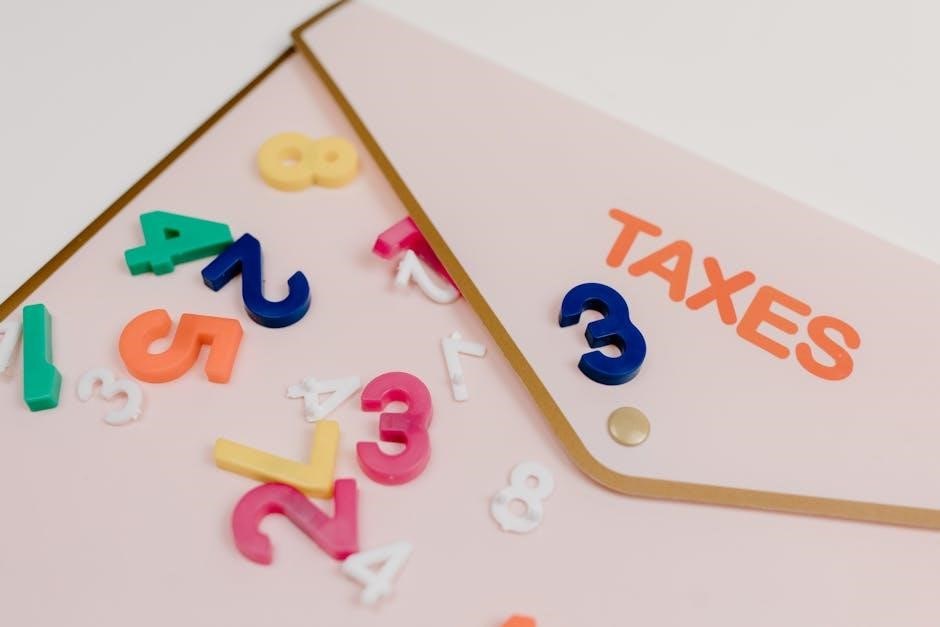The Year 5 Maths Assessment evaluates students’ understanding of key mathematical concepts and skills, ensuring they are prepared for higher-level studies. It focuses on problem-solving, numerical operations, and practical applications, providing insights into student progress and areas for improvement. This assessment is a critical tool for educators to adapt teaching strategies and support individual learning needs effectively.
Overview of the Assessment
The Year 5 Maths Assessment is a standardized evaluation designed to measure students’ mastery of mathematical concepts and skills. It covers key topics such as arithmetic, algebra, geometry, and data handling, aligning with curriculum standards. The assessment typically includes a mix of multiple-choice questions, short-answer problems, and open-ended tasks to evaluate problem-solving abilities. It aims to identify strengths and areas needing improvement, providing educators with actionable insights to tailor instruction. The assessment is structured to be engaging and challenging, ensuring a comprehensive understanding of Year 5 maths concepts while preparing students for future academic success.
Importance of Year 5 Maths Assessment
The Year 5 Maths Assessment plays a crucial role in evaluating students’ mathematical understanding and skills. It helps identify strengths and areas needing improvement, guiding future learning. By aligning with curriculum standards, the assessment ensures students are well-prepared for higher-level maths. It also provides educators with insights to adapt teaching strategies, fostering a more personalized learning experience. Additionally, the assessment evaluates problem-solving abilities and critical thinking, essential skills for academic success. Regular maths assessments like this help build confidence and a strong foundation for more complex concepts in later years, ensuring students are adequately challenged and supported in their mathematical journey.

Structure of Year 5 Maths Assessment
The Year 5 Maths Assessment is structured to evaluate various mathematical skills through multiple question types and problem-solving tasks, ensuring a comprehensive understanding of key concepts and their practical applications.
Key Topics Covered
The Year 5 Maths Assessment covers essential topics such as arithmetic operations, numerical reasoning, and problem-solving. It includes fractions, decimals, percentages, geometry, and measurement. Students are tested on their ability to interpret data, understand shapes, and apply mathematical concepts to real-world scenarios. The assessment also focuses on mental maths, algebraic thinking, and word problems, ensuring a well-rounded evaluation of mathematical proficiency. These topics are designed to align with curriculum standards, preparing students for advanced maths in higher grades while reinforcing foundational skills.
Question Types and Formats
The Year 5 Maths Assessment features a variety of question types to gauge different skills. Multiple-choice questions test recall and recognition, while short-answer questions assess problem-solving and calculation accuracy. Word problems require applying mathematical concepts to real-life scenarios, enhancing comprehension. Open-response questions allow students to demonstrate reasoning and critical thinking. The assessment also includes mental maths tasks, algebraic expressions, and data interpretation questions involving charts and graphs. This diverse format ensures a comprehensive evaluation of mathematical understanding and problem-solving abilities, preparing students for more complex challenges in higher grades.

Sample Questions and Answers
Sample questions and answers provide insights into the assessment’s format, covering arithmetic, word problems, and multi-step questions. These examples help students familiarize themselves with the test style and content, enabling them to practice and improve their problem-solving skills effectively.
Arithmetic and Numerical Operations
Arithmetic and numerical operations are fundamental components of the Year 5 Maths Assessment, testing proficiency in basic calculations and mental maths. Students are assessed on their ability to perform accurate additions, subtractions, multiplications, and divisions, including multi-digit numbers. The questions may involve applying these operations to solve real-world problems or interpreting numerical data. Mastery of these skills is essential for building a strong foundation in mathematics, as they form the basis for more complex concepts in higher grades. Regular practice and understanding of place value, fractions, and decimals are crucial for success in this area.
Word Problems and Applications
Word problems and applications in the Year 5 Maths Assessment require students to apply mathematical concepts to real-life scenarios. These questions test the ability to interpret and translate written descriptions into numerical solutions. Common themes include money, time, measurements, and multi-step calculations. Students must identify relevant information, choose appropriate operations, and justify their reasoning. Word problems enhance critical thinking and problem-solving skills, preparing students for practical uses of mathematics in everyday situations. They also assess the ability to communicate solutions clearly and logically, ensuring a deep understanding of mathematical principles and their applications.
Preparation Strategies
Effective preparation involves regular practice, understanding key concepts, and using recommended resources. Consistent review and seeking help when needed are crucial for success in the assessment.
Effective Study Techniques
Effective study techniques for Year 5 Maths Assessment involve creating a structured study schedule, practicing regularly, and focusing on understanding concepts. Using flashcards for quick revision, solving sample questions, and breaking problems into smaller steps can enhance learning. Encouraging active participation in maths games and activities can also improve engagement and retention. Utilizing online resources, such as educational videos and interactive tools, provides additional support. Regularly reviewing mistakes and seeking clarification from teachers or parents helps build confidence and mastery of key skills. Consistent practice and a positive mindset are essential for achieving success in the assessment.
Recommended Resources and Tools
Effective preparation for the Year 5 Maths Assessment can be supported by various resources and tools. Online platforms like Khan Academy, Mathletics, and BBC Bitesize offer interactive lessons and practice exercises. Worksheets and past papers from educational websites provide valuable practice. Textbooks such as “Principles and Standards for School Mathematics” and “Mastering Mathematics” are excellent for in-depth learning. Additionally, educational apps like Photomath and Desmos can help visualize problems and concepts. Utilizing flashcards for key formulas and setting up a study schedule with digital calendars can enhance organization and retention. These tools collectively foster a comprehensive understanding and confidence in maths skills.

Interpreting Assessment Results
Understanding scoring systems and feedback helps identify strengths, weaknesses, and areas for improvement, enabling educators and parents to tailor support and learning strategies effectively.
Understanding Scoring and Feedback
Assessment results are typically presented with clear scoring systems, such as points or percentages, to measure student performance. Feedback is provided to highlight strengths and areas needing improvement. This feedback often includes specific comments or rubrics, helping students and educators understand achievements and gaps. By reviewing scoring criteria and feedback, learners can identify where to focus their efforts for better results. Transparent scoring ensures fairness, while detailed feedback supports personalized growth and targeted practice.
Using Results for Improvement
Assessment results are valuable tools for driving progress in maths education. By analyzing strengths and weaknesses, teachers and students can identify areas needing attention. The data helps create targeted study plans, ensuring focused practice on specific skills. Educators can adjust teaching methods to address common challenges, while students gain clarity on where to concentrate their efforts. Regularly tracking progress over time allows for measurable improvement and informed decision-making. This data-driven approach fosters a growth mindset, helping learners achieve their full potential and build confidence in their mathematical abilities.

Frequently Asked Questions
Common questions about Year 5 Maths Assessment include understanding test formats, preparation tips, and interpreting results. Students and parents often inquire about key topics and improvement strategies.
Common Concerns and Answers
Common concerns about the Year 5 Maths Assessment often revolve around understanding the test format and preparing effectively. Parents and students may worry about time management and interpreting results. Addressing these concerns involves practicing past papers and seeking teacher guidance. Clarifying doubts early helps build confidence. Understanding scoring systems and using feedback to improve is also a frequent topic of discussion. Ensuring a strong foundation in key topics like arithmetic and problem-solving is advised. Regular review and targeted study strategies can alleviate anxieties and enhance performance.
Clarifying Doubts and Misconceptions
Clarifying doubts and addressing misconceptions is essential for student success in the Year 5 Maths Assessment. Common misunderstandings often involve problem-solving strategies or arithmetic concepts. Students may struggle with interpreting word problems or applying mathematical rules correctly. Teachers and parents can help by breaking down complex ideas into simpler steps and providing examples. Encouraging students to ask questions and review challenging topics ensures a stronger grasp of the material. Regular practice and targeted feedback also help resolve misconceptions, fostering confidence and improving overall performance in the assessment. A growth mindset and proactive approach to learning are key.
The Year 5 Maths Assessment is a valuable tool for measuring progress and understanding. By addressing misconceptions and practicing regularly, students can build confidence and achieve success.
Final Tips and Encouragement
To excel in the Year 5 Maths Assessment, encourage regular practice and a growth mindset. Use online resources like Google Sheets for data analysis and educational apps for interactive learning. Break problems into smaller steps to build confidence. Review mistakes to understand areas needing improvement. Celebrate progress, no matter how small, to stay motivated. Encourage seeking help from teachers or peers when needed. Remind students that maths is a skill that improves with effort. Stay positive, and emphasize the importance of perseverance and enjoyment in learning.
